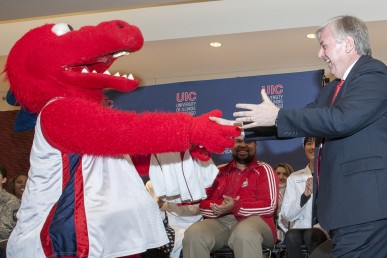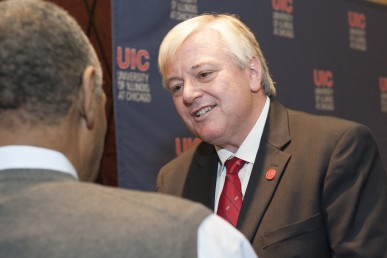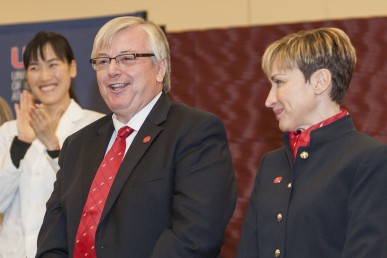New chancellor: excited, honored, humbled by UIC opportunity
UIC’s new chancellor, Michael Amiridis, is a top administrator who visits each of his current university’s 80-plus departments at least once a year; an engineering researcher focused on environmental problems; and a Greek immigrant concerned that the cost of American higher education is excluding first-generation, underrepresented and middle-class students.
About 300 people — a good percentage of everyone still on campus after fall semester ended last week — came to meet Amiridis Thursday afternoon at events on the east and west sides of campus.
“I’m honored, and at the same time I’m very humbled, to be selected as the new leader of the University of Illinois at Chicago, the model of a public, urban, research university in this country and an institution that is located in a most vibrant global city,” he said after his introduction by U of I President Robert Easter.
“I believe with its rich history of success in high quality education, in the creation and application of new knowledge, and with its unique strengths in the health sciences and in community engagement, access and inclusion, UIC is well-positioned for the future,” he said.

UIC mascot Sparky D. Dragon welcomes new chancellor Michael Amiridis. Photo: Roberta Dupuis-Devlin/UIC Photo Services
Amiridis, 52, executive vice president for academic affairs and provost at the University of South Carolina in Columbia, will take office March 16, pending appointment by the university Board of Trustees Jan. 15.
“His talents quickly moved him up the ladder of leadership after he joined the faculty of the University of South Carolina’s flagship Columbia campus in 1994,” Easter said. “He has a proven record of building academic and research excellence and a clear vision of the key role that public universities play in driving progress and economic growth.”
Amiridis, who turned to greet the students sitting behind him before beginning his remarks, joked about his “distinct Southern accent.”
He recalled his experience as a first-generation college student who left Greece for graduate studies at University of Wisconsin-Madison, “navigating a complex college education system with very limited help from home.”
“UIC has proven through its history that you can continue to serve first-generation students at the highest quality level while you develop Carnegie 1 graduate and research programs, and while you provide world-class health education and health care delivery,” he said.
Amiridis listed several things he is excited about: the use of technology in learning; “transparency and accountability” in describing student success; public-private partnerships; and the opportunities for global education available in a major city like Chicago.
“I think he said the right things. I’m very encouraged and I look forward to working with him,” said Catherine Vincent, associate professor of nursing and secretary of the UIC Senate.
Amiridis joined the faculty at University of South Carolina as professor of chemical engineering. He was department head, then dean of engineering before becoming provost in 2009.
“I continued to have a research lab, as dean and as provost, which is kind of unusual, because I wanted to be an active member of the faculty — and frankly, because I like research,” he said after his speech.

As UIC’s new chancellor, “I’m going to meet the faculty and staff in their working environment and try to understand what the problems are,” Michael Amiridis says. Photo: Roberta Dupuis-Devlin/UIC Photo Services
He studies catalysts, substances that can accelerate chemical reactions without reacting themselves, on a nano-scale. His work has practical applications related to energy, pollutants and auto emissions control. “We need to find technological solutions to the problems that we face environmentally. That’s something I’m passionate about,” he said.
Amiridis’ research has been funded by the National Science Foundation, the Department of Energy and the private sector. He is a fellow of the American Association for the Advancement of Science.
“It’s really exciting to have a chemical engineer as UIC’s next chancellor,” said Vikas Berry, associate professor of chemical engineering. “He brings a wide range of interests — he’s a strong researcher, a winner of the prestigious NSF Career award, and has been involved with the NSF’s REU program encouraging undergraduates’ interest in research by bringing them into labs.
“He is a leader in catalysis research and has generated multi-million dollars in extramural funding towards activities in research, education and infrastructure improvement. It’s going to be exciting to see what he does here at UIC.”
“His extensive background and leadership can bring new strategies to the development of energy science at UIC,” said Amin Salehi-Khojin, assistant professor of mechanical and industrial engineering.
Mrinalini Rao, chair of the search committee and professor of physiology and biophysics, said Amiridis’ experience as provost at a university with health sciences colleges is important. “We have an individual who has had experience across the spectrum,” she said.
The university will also have a new leader at the top: the appointment of new president Timothy Killeen, vice chancellor for research and president of the Research Foundation of the State University of New York, is on the trustee’s Jan. 15 agenda as well.

Amiridis and his wife, Ero Aggelopoulou-Amiridis. They have two teenaged children. Photo: Roberta Dupuis-Devlin/UIC Photo Services
“We have a whole new leadership structure coming in,” said Karen Colley, dean of the Graduate College. “I’m very excited to see the priorities of this person and what vision they have for our campus.”
Amiridis will succeed Chancellor Paula Allen-Meares, who steps down Jan. 15 after leading UIC since 2009. Eric Gislason, interim vice chancellor for academic affairs and provost, will be interim chancellor until March 15.
“Dr. Paula Allen-Meares did a terrific job and has gotten us to this current position where we are now going to benefit from her hard work,” said Jerry Krishnan, a member of the search committee and associate vice president for population health sciences in the Office of the Vice President for Health Affairs.
Krishnan mentioned Amiridis’ sense of humor, which came across in the search interview.
“He really raised the energy level in the room,” Krishnan said. “We thought he has a great story, and the story fits well with what UIC is like.”
Categories
Topics
chancellor, engineering, environment, first-generation students, nanotechnology, student success, university administration
